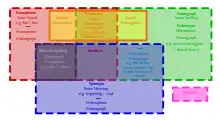homograph
See also: Homograph
English
WOTD – 14 October 2007
Pronunciation
- (Received Pronunciation) IPA(key): /ˈhɒməɡɹɑːf/, /ˈhəʊməɡɹæf/
- (US) IPA(key): /ˈhɑːməɡɹæf/, /ˈhoʊməɡɹæf/
,Audio (US) (file) Audio (US) (file) Audio (AU) (file)
Usage notes
Homographs are a kind of homonym in the loose sense of that term, i.e. a word that is either a homophone (same sound) or a homograph (same spelling). (The strict sense of homonym is a word that both sounds and is spelled the same as another word.) Specifically, homographs must have the same spelling, though they usually have different meanings and may be pronounced differently.
- The verb bear (“to carry”) and the noun bear (“large omnivorous mammal”) are homographs with the same pronunciation and different etymological origins.
- The verb alternate (“to go back and forth”) and the adjective alternate (“following by turns”) are homographs with different pronunciations but close etymological origins. Such homographs are also heteronyms.
- The verb meet (“to encounter”) and the noun meat (“food”) are not homographs since they have different spellings.
Related terms
Translations
word with the same spelling but different meaning
|
See also

Euler diagram of choice semantic relations.
| Noun (cat) | Sound | Spelling | Meaning | phone/graph |
|---|---|---|---|---|
| homonym | same | same | different | homophone & homograph |
| heteronym (cat) | different | same | different | heterophone & homograph |
| homophone | same | different | different | homophone (cat) & heterograph |
| alternative pronunciation | different | same | same | heterophone & homograph |
| synonym | different | different | same | heterophone & heterograph |
| alternative spelling | same | different | same | homophone & heterograph |
| identical | same | same | same | homophone & homograph |
| distinct | different | different | different | heterophone & heterograph |
This article is issued from Wiktionary. The text is licensed under Creative Commons - Attribution - Sharealike. Additional terms may apply for the media files.